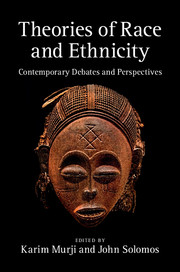Book contents
- Frontmatter
- Contents
- Notes on contributors
- Preface
- 1 Introduction: situating the present
- Part I Debates
- Part II Perspectives
- Introduction to Part II
- 8 Superseding race in sociology: the perspective of critical rationalism
- 9 Critical race feminism
- 10 Performativity and ‘raced’ bodies
- 11 Racism: psychoanalytic and psychosocial approaches
- 12 The sociology of whiteness: beyond good and evil white people
- 13 (Sexual) whiteness and national identity: race, class and sexuality in colour-blind France
- 14 Racial comparisons, relational racisms: some thoughts on method
- 15 Conclusion: back to the future
- Index
- References
14 - Racial comparisons, relational racisms: some thoughts on method
Published online by Cambridge University Press: 18 December 2014
- Frontmatter
- Contents
- Notes on contributors
- Preface
- 1 Introduction: situating the present
- Part I Debates
- Part II Perspectives
- Introduction to Part II
- 8 Superseding race in sociology: the perspective of critical rationalism
- 9 Critical race feminism
- 10 Performativity and ‘raced’ bodies
- 11 Racism: psychoanalytic and psychosocial approaches
- 12 The sociology of whiteness: beyond good and evil white people
- 13 (Sexual) whiteness and national identity: race, class and sexuality in colour-blind France
- 14 Racial comparisons, relational racisms: some thoughts on method
- 15 Conclusion: back to the future
- Index
- References
Summary
The prevailing academic paradigm in analyzing race and racism, ethnic and racial relations, has been comparative. Analysts contrast and compare different societies, historically or contemporarily, to reveal similarities and differences regarding popular ethnoracial expression as well as state formulations, structures and responses. In this chapter, I suggest that this dominant paradigm overlooks a more compelling mode of critical analysis regarding race and racism, namely, the influencing and reinforcing relations between different national expressions of racial and ethnic commitment. Noting the relative methodological strengths of comparativism and relationalities, I map out what a relational critical countermethod looks like, arguing that it incorporates comparative considerations, where they arise, within its scope.
Much of the work on race and racism has been indexed to local national contexts. This mode of analysis has ranged across historical, sociological, political, legal, cultural and, indeed, critical contributions. It marks a great deal of what goes under the designation of critical race studies. Racial conception and racist social arrangements, at least on first blush, seem indelibly tied to specific national sociopolitical, economic, legal and cultural conditions. Racial arrangements and their implications are overwhelmingly considered a response to and a product of local arrangements, relations of power and historical legacies. They seem to acquire meaning and take on significance only as a function of the specific contexts contained and constrained by the fabric of life, meaning making and administrative arrangements indexed to a specific society, a state configuration, at a given place and time. In this, racial studies, in the broad, follow the dominant strand of ethnic studies quite faithfully.
- Type
- Chapter
- Information
- Theories of Race and EthnicityContemporary Debates and Perspectives, pp. 251 - 262Publisher: Cambridge University PressPrint publication year: 2014
References
- 8
- Cited by



